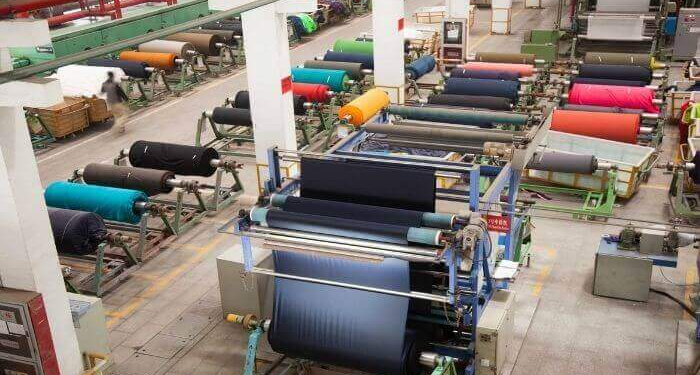Textile imports into Nigeria more than doubled in two years, hitting a 15-high despite efforts to revive the sector.
Data from the National Bureau of Statistics (NBS) shows that the importation of textile and textile articles rose by 100.3 per cent to N365.5 billion in 2022, the highest in at least 15 years, from N182.5 billion in 2020.
The last time the textile, apparels and footwear subsector recorded a positive growth was in 2018, data obtained from the NBS indicates.
Since then, the federal government, through the Central Bank of Nigeria (CBN), has rolled out several intervention programmes, including provision of financial support, training and foreign exchange restrictions for all forms of textile materials at the official exchange market, importation of textiles products.
“The CBN has not implemented what they planned to do three years ago because people are still importing even more than before. And with this surge in imports, how do we prepare to reap the benefits of the African Continental Free Trade Area agreement,” Hamma Kwajaffa, director-general of Nigerian Textile Manufacturers Association, told BusinessDay.
He said the central bank wanted to spur up foreign investments by freezing the accounts of importers to make them establish factories in the country rather than importing. “But the country’s high cost of production, which is making us uncompetitive, discourages such investments.”
According to Kwajaffa, the country has at least 24 textile industries but only three are functioning properly because some ministries are patronising them, otherwise they would have closed down long ago.
The textile industry, one of the top contributors to the manufacturing sector, plays an important role in an economy. It is believed to create huge employment for both skilled and unskilled labour, generate export earnings, attract foreign direct investment and reduce poverty.
In the 1970s and early 1980s, Africa’s most populous nation had over 180 textile mills that employed more than one million Nigerians. Some of the mills were United Nigerian Textile Limited, Aswani Textile, Afprint, Asaba Textile Mills, and Edo Textile Mills.
But these firms disappeared in the 1990s as they were unable to compete in an atmosphere of smuggling, unbridled importation, inadequate power supply, inconsistent government policies and insecurity.
To revive the industry, the country banned the importation of textiles and other fabrics in 2008. But in 2015, the ban was lifted while a 35 percent import duty was placed on it.
Four years later, the CBN imposed FX restriction on importation of textile and textile materials into the country.
“We will provide financial support to textile manufacturers with the provision of funds at single-digit rate, to refit, re-tools and upgrade their factories in order to produce high-quality textile materials for the local and export market,” Godwin Emefiele, governor of CBN, said.
In 2020, the apex bank said it had invested over N120 billion across the cotton, textile and garment value chain and has increased industry capacity of ginneries from an average of 19 percent to 51 percent since the inception of its intervention programmes in the industry.
It said between 2019 and 2021, over 620,000 direct and indirect jobs were created.
“It is not a disappointment that the CBN did not achieve success because all the variables that were necessary to make the industry succeed were not addressed,” said Gabriel Idahosa, deputy president of Lagos Chamber of Commerce and Industry.
“One of such was that the country was not producing cotton, the primary raw material at a competitive price relative to countries like China, Bangladesh and several other countries that produce cotton at a far lower price than Nigeria,” he said.
He added that the cost of textile production is very high because it is energy-intensive.
“Also, the depreciating value of the naira made the importation of machineries and cotton much higher than the price of textile products of other countries,” he said.
According to Idahosa, these factors completely knocked out the industry’s capacity to compete worldwide.
Nigeria is among the top cotton-producing countries in West Africa. According to the United States Department of Agriculture, the country’s cotton production rose to 1.6 million metric tonnes in 2020 from 920,000 metric tonnes in 2019.
“The market of foreign textile in Nigeria is around 80-90 percent. So the market is largely dominated by imports. And even if you restrict or ban, it does not guarantee local production because the borders are very porous, making a lot of smuggling to still be going on,” said Muda Yusuf, chief executive officer of Centre for the Promotion of Private Enterprise.
“And even if there is local production, the high inflationary environment will make the products less affordable in a country where there is so much poverty.”
He said many textile companies have closed shop despite all the protectionist policies. “All the intervention funds, many of the manufacturers have not been able to pay them back.”
Idahosa of LCCI said in order to improve local production and competitiveness of the textile industry, the government should first identify the challenges or threats facing the industry.
“We need to address raw materials and the cost of power in a very significant manner, not this very little effort here and there that does not have a critical mass,” he said.
A recent report by the Oxford Business Group said building the capacities of Small and Medium-sized Enterprises (SMEs) will also help the industry.
“This can be done through training programmes in priority areas (including supply, quality control and marketing of textiles), preparing investment profiles to attract foreign direct investment in the textile sector and providing information for micro-enterprises and SMEs in the region and buyers outside of Africa,” it said.



